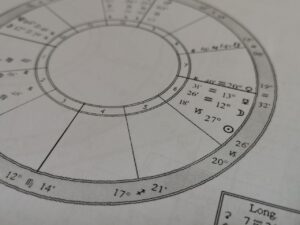
In the intricate tapestry of astrology, each of the twelve houses holds a unique key to understanding various aspects of our lives. The sixth house, often referred to as the house of health and service, offers profound insights into our physical well-being, daily routines, work habits, and our willingness to serve others. As we embark on this enlightening journey, we will delve into the significance of the sixth house in astrology, unveiling the secrets it holds about our approach to health, work, and the satisfaction derived from acts of service.
The Sixth House Cusp and Its Significance:
The sixth house begins at the point where the sign of the zodiac associated with your sixth house cusp is situated. This critical point, known as the sixth house cusp, marks the entry into the house of health and service. The zodiac sign adorning this cusp is a unique feature in every individual’s birth chart, shaping their approach to work, health, daily routines, and the desire to assist others.
Aries on the Sixth House Cusp:
With Aries gracing your sixth house cusp, you approach work and health with energy and assertiveness. You may be inclined to take the initiative and enjoy work that allows you to be a leader or pioneer.
Taurus on the Sixth House Cusp:
When Taurus occupies the sixth house cusp, you seek stability and consistency in your work and health routines. You may have a strong desire for job security and value the comfort of a steady, well-established routine.
Gemini on the Sixth House Cusp:
With Gemini on the sixth house cusp, you approach work and health with curiosity and adaptability. You may excel in roles that require communication, multitasking, and intellectual engagement.
Cancer on the Sixth House Cusp:
When Cancer graces the sixth house cusp, your approach to work and health is nurturing and emotionally connected. You may find fulfilment in roles that involve caregiving, and your well-being is closely tied to your emotional state.
Leo on the Sixth House Cusp:
With Leo on the sixth house cusp, you bring confidence and creativity to your work and health endeavours. You may seek recognition in your career and find motivation in activities that allow you to express your unique talents.
Virgo on the Sixth House Cusp:
When Virgo occupies the sixth house cusp, practicality and attention to detail define your approach to work and health. You excel in roles that require precision and organization, and you may be health conscious.
Libra on the Sixth House Cusp:
With Libra on the sixth house cusp, you seek balance and harmony in your work and health routines. You may enjoy collaborative environments and value fairness and cooperation in your career.
Scorpio on the Sixth House Cusp:
When Scorpio graces the sixth house cusp, you approach work and health matters intensely and with a desire for transformation. You may be drawn to roles that involve research, psychology, or deep healing.
Sagittarius on the Sixth House Cusp:
With Sagittarius on the sixth house cusp, you bring optimism and a love for exploration to your work and health routines. You may enjoy careers involving travel, education, or philosophy.
Capricorn on the Sixth House Cusp:
When Capricorn occupies the sixth house cusp, you approach work and health with a strong sense of responsibility and discipline. You value long-term goals and may excel in roles that require leadership and commitment.
Aquarius on the Sixth House Cusp:
With Aquarius on the sixth house cusp, you have an innovative and unconventional approach to work and health. You may be drawn to technology, humanitarian causes, and progressive fields.
Pisces on the Sixth House Cusp:
When Pisces graces the sixth house cusp, you approach work and health with sensitivity and intuition. You may be inclined to roles that involve creativity, spirituality, or healing.
Health and Service:
The sixth house primarily concerns itself with matters related to health, work, daily routines, and the desire to be of service to others. It governs our approach to maintaining well-being, our attitudes toward work, and our willingness to assist those in need. Here are some key themes associated with the sixth house:
Health and Well-Being: This house represents our physical health and the daily routines we establish to maintain it. It reflects our approach to nutrition, exercise, and overall self-care.
Work and Employment: The sixth house signifies our employment, job responsibilities, and work environment. It reflects our attitude toward work, our commitment to our careers, and our ability to be productive.
Daily Routines: This house governs our daily habits and routines. It reflects how organized and structured we are in our daily lives, including our schedules and time management.
Service and Helping Others: The sixth house is also linked to our willingness to assist others and be of service to the community. It reflects our sense of duty, altruism, and desire to contribute to the well-being of others.
The Role of Planets in the Sixth House:
Planets positioned in the sixth house significantly influence our approach to work, health, and service. Each planet contributes its unique energy to this area of life:
Sun in the Sixth House: The Sun in the sixth house emphasizes your identity and ego in relation to your work and health. You may seek recognition and take pride in your job and physical well-being.
Moon in the Sixth House: The Moon highlights your emotions and instincts in daily routines and work. You may have a strong need for emotional fulfilment in your job and may experience fluctuations in your daily habits based on mood.
Mercury in the Sixth House: Mercury enhances your communication and analytical skills in your work and daily routines. You may excel in roles that require problem-solving and communication.
Venus in the Sixth House: Venus adds a touch of harmony and beauty to your work environment and daily life. You may seek pleasant and aesthetically pleasing workspaces and may find joy in helping others.
Mars in the Sixth House: Mars brings energy and drive to your work and health pursuits. You have a strong work ethic and may thrive in roles that require physical activity and assertiveness.
Jupiter in the Sixth House: Jupiter often indicates growth and expansion in work and health matters. You may find opportunities for career advancement and personal development in your daily routines.
Saturn in the Sixth House: Saturn can bring a sense of responsibility and discipline to your work and health habits. You may have a strong work ethic but may also need to guard against perfectionism and overwork.
Uranus in the Sixth House: Uranus adds an element of unpredictability and innovation to your work and daily routines. You may seek unconventional and progressive careers and may experience sudden changes in your work life.
Neptune in the Sixth House: Neptune infuses your work and daily life with a dreamy and idealistic quality. You may seek meaningful and spiritually fulfilling work, but it is essential to stay grounded in reality.
Pluto in the Sixth House: Pluto intensifies your approach to work and health matters. You may undergo profound transformations in your career and daily routines, often emerging stronger and wiser.
North Node in the Sixth House: The North Node suggests that part of your life’s purpose is to focus on work, health, and service. You may need to embrace routines and contribute to the well-being of others as you fulfil your life’s mission.
Aspects to Planets in the Sixth House:
The aspects (angular relationships) between planets in the sixth house and those in other houses can add depth to the interpretation. For example, a harmonious trine aspect between Mercury in the sixth house and Mars in the second house might indicate a natural aptitude for communication in a finance-related career.
Transits and Progressions Through the Sixth House:
Transits (the movement of planets through the sky) and progressions (gradual shifts of planets in your natal chart) through the sixth house can trigger significant events related to work, health, and service. For instance, the transit of Saturn through the sixth house often brings a period of increased responsibility and discipline in your career and daily routines.
The Sixth House and Your Physical Temple:
The sixth house in astrology is a sacred space where we honour our physical bodies, engage in our daily work, and find fulfilment through acts of service. It invites us to contemplate our well-being, recognize the value of our contributions, and structure our lives for optimal health and productivity.
Conclusion: The Sixth House and the Symphony of Daily Life:
The sixth house in astrology orchestrates the daily symphony of our existence, weaving together themes of health, work, routines, and service. It reminds us that our bodies are temples to be cared for and that our daily actions have the power to shape our well-being and impact the lives of others.
By exploring the depths of your sixth house, you gain profound insights into your work habits, approach to health, and the satisfaction derived from service. It is a house that teaches us the art of balance, the importance of self-care, and the joy that arises from helping others.
References
Woolfolk, Joanna Martine. The Only Astrology Book You’ll Ever Need. Taylor Trade Publishing, 2012.
Forrest, Steven. The Inner Sky: How to Make Wiser Choices for a More Fulfilling Life. Seven Paws Press, 2001.
Hickey, Isabel. Astrology: A Cosmic Science. CRCS Publications,1992.
Lineman, Rose & Popelka, Jan. Compendium of Astrology. Whitford Press, 1984.
Kent, April Elliott. The Essential Guide to Practical Astrology. Two Moon Publishing, 2016.
Sasportas, Howard. The Twelve Houses: Exploring the Houses of the Horoscope. Flare, 2010.
Houlding, Deborah. The Houses: Temples of the Sky. Wessex, 2006.
Arroyo, Stephen. Astrology, Psychology, and the Four Elements: An Energy Approach to Astrology and Its Use in the Counseling Arts. CRCS Publications, 1975.
Brady, Bernadette. Predictive Astrology: The Eagle and the Lark. Weiser, 1999.
